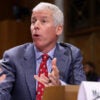Materials obtained in the U.S. SEAL raid that killed Osama bin Laden confirm what Heritage suspected all along: Al-Qaeda considered attacking tanker ships and other maritime energy infrastructure.
Bin Laden expected to drive up the price of oil and intended to cause considerable damage to the U.S. and other oil-dependent economies. As The Heritage Foundation’s 2008 and 2010 energy simulations showed, organized terrorist attacks would cause a massive disruption and long-term decline in oil production and have a significant global geo-economic impact.
Both of Heritage’s simulations of terrorism-caused energy crises demonstrated major gaps and vulnerabilities in the global energy infrastructure and an insufficient capacity to reconstitute oil production following a concerted transnational terrorist operation.
The fresh evidence that al-Qaeda views oil infrastructure and other key energy nodes around the globe as high-value targets validates the simulation’s findings and affirms the foresight and validity of key recommendations. Heritage research demonstrated that major producing and consuming nations tend to form geo-strategic alliances to act in concert and protect their own national interests. In addition, cooperative actions among alliances have the potential to ameliorate the severity of long-term oil disruptions following the terrorist attacks.
Not all findings were encouraging. For example, during the second Heritage game (2010), it became clear that the United States was not equipped to effectively deal with the consequences of such attacks. The simulated interagency process after the attack wasted precious reaction time, while government bureaucracies misunderstood or misinterpreted other nations’ signals.
Five policy recommendations stand out from the Heritage cooperative policy research.
1. Early Warning System. The United States and its partners should set up an early warning system for terrorist attacks on U.S. and allied energy infrastructure and sea lines of communication and commerce. This would enhance their protection and formulate contingencies for rapid security and disaster response. This has to be done unilaterally by the U.S. government, as well as bilaterally and multilaterally using international alliances such as NATO.
2. Strong U.S. Leadership. U.S. leadership in recovery efforts and the coordination of international energy policy is indispensible. A lack of U.S. leadership weakens the U.S. and key allies’ international positions during a crisis, by creating a vacuum and denying key security capabilities that could be brought to bear.
3. Keep Markets Free. Heritage’s economic modeling demonstrated that relying on market forces goes a long way to restore confidence in markets—including with consumers—following an attack. All things being equal, the more nations rely on market principles to direct resources towards recovery efforts, the faster the global economy will recover. Reliance on markets and security cooperation can do much to restore the confidence of governments, corporations, and consumers.
4. Public-Private Cooperation. The U.S. government and oil companies should address America’s institutional inability to formulate proactive, multilayered responses to jointly address crises such as those presented in the scenario—before the actual attacks take place. Major producer and consumer nations and the energy-producing and energy-consuming companies need to cooperate and communicate better to prevent violent disruptions and post-disruption economic downturns.
5. Prepare the Private Sector. Heritage recommends giving selected private-sector contractors security clearances before attacks take place. This would give contractors access to information that could help them coordinate more effective responses under difficult post-attack conditions.
To those who dismiss the possibility of major disruptive attacks on critical infrastructure—or prefer not to think about them—documents found in bin Laden’s compound prove that terrorist assaults on critical global energy (and other) infrastructure are not a fantasy. Accordingly, planning for responses to such attacks should be undertaken systematically across the U.S., including foreign governments’ security and economic decision-making offices and the relevant private sector participants, and executed along a multi-year, permanently updated master plan.
Co-authored by Michaela Bendikova





























